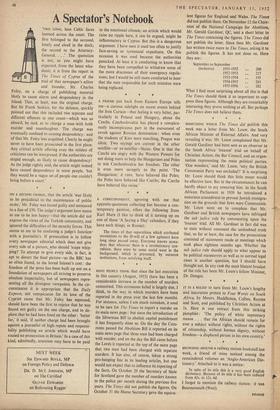ON A SECOND CHARGE, that the article 'was likely to
be prejudicial to the maintenance of public order,' Mr. Foley was found guilty and sentenced to a fine of £50. The judge's argument here seems to me to be less happy—that the article did not express the views of the Turkish community, and ignored the difficulties of the security forces. This seems to me to be confusing a judge's function with a journalist's. If prosecution is to follow every newspaper editorial which does not give every side of a picture,, who should 'scape whip- ping? To attempt to give every side, in fact, is apt to distort the final picture—as the 13BC has so often found, to the bored listener's cost: the freedom of the press has been built up not on a foundation of newspapers all striving to preserve absolute impartiality, but of newspapers repre- senting all the divergent viewpoints. In the cir- cumstances it is appropriate that the Daily Express, not conspicuous for its love of the Cypriot cause that Mr. Foley has espoused, should have been the first to rejoice that he was found not guilty on the one charge, and to de- plore that he had been fined on the other : 'better far,' it said, 'if neither charge had been brought against a journalist of high repute and responsi- bility publishing an article which would have roused no prosecution in Britain? In a case of this kind, admittedly, attention may have to be paid to the emotional climate; an article which would raise no ripple here, it can be argued, might be inflammatory in Cyprus. But this is a dangerous argument. I have seen it used too often to justify face-saving or tyrannical expedients. On this occasion it was used because the authorities panicked. At least it is comforting to know that they have been compelled to withdraw some of the more draconian of their emergency regula- tions; but I would be still more comforted to hear that the men responsible for such mistakes were being replaced.


































 Previous page
Previous page